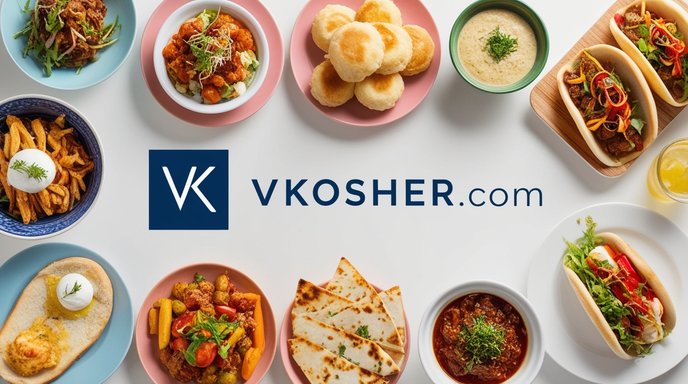Understanding Kosher in 2024: Tradition Meets Modernity
Kosher, a term that has held significant importance in Jewish dietary laws for centuries, continues to evolve in the contemporary world. In 2024, the concept of kosher is not just a religious or cultural practice but a phenomenon that intersects with modern technology, global food trends, and changing consumer behaviors. The year 2024 sees kosher as a symbol of purity, health, and ethical food choices that resonate beyond the Jewish community.
The Evolution of Kosher Certification
Kosher certification has always been central to ensuring that food products adhere to the dietary laws outlined in the Torah. In 2024, the certification process has become more rigorous and technologically advanced. With the advent of blockchain technology, kosher certification agencies are now able to provide a more transparent and traceable system for consumers. This innovation allows individuals to trace the origins of their food, ensuring it meets kosher standards from farm to table.
Moreover, the demand for kosher products has expanded globally, with more non-Jewish consumers seeking kosher-certified foods for their perceived health benefits and ethical considerations. This trend has led to an increase in the number of kosher-certified products available in supermarkets worldwide, ranging from traditional Jewish foods to contemporary snacks and beverages.
Technological Innovations in Kosher Food Production
The kosher food industry in 2024 is marked by significant technological advancements that streamline production processes while maintaining adherence to kosher laws. One of the most notable innovations is the use of artificial intelligence in monitoring and ensuring compliance with kosher standards during food production. AI-powered systems are now capable of analyzing every step of the production process, from the sourcing of ingredients to the final packaging, ensuring that all aspects meet kosher requirements.
Another major development is the rise of lab-grown meats and plant-based alternatives that are kosher-certified. As the global population becomes more conscious of the environmental impact of meat production, kosher consumers are also embracing these alternatives. The challenge, however, lies in ensuring that these new products align with kosher dietary laws, particularly when it comes to the separation of meat and dairy and the prohibition of certain animal products.
The Globalization of Kosher Cuisine
Kosher cuisine has long been associated with traditional Jewish foods such as challah, matzo ball soup, and gefilte fish. However, in 2024, kosher cuisine is a global fusion of flavors and ingredients, reflecting the diverse Jewish diaspora. From kosher sushi in Tokyo to kosher tacos in Los Angeles, the globalization of kosher food has brought new and exciting culinary experiences to consumers worldwide.
This fusion of flavors is not only a result of cultural exchange but also a response to the growing demand for kosher options in non-traditional markets. In countries with small Jewish populations, kosher food is gaining popularity among health-conscious consumers and those interested in exploring diverse cuisines. This trend has prompted many restaurants and food manufacturers to seek kosher certification for their products, further expanding the availability of kosher foods globally.
Challenges Facing the Kosher Industry
Despite the growth and innovation in the kosher food industry, 2024 also presents several challenges. One of the primary concerns is the rising cost of kosher certification, which can be prohibitively expensive for small businesses. The rigorous standards and frequent inspections required to maintain kosher certification often lead to higher production costs, which are then passed on to consumers. This can make kosher products less accessible to those on a budget, particularly in regions where kosher options are limited.
Another challenge is the need for increased awareness and education about kosher practices among both consumers and producers. While the global demand for kosher products is growing, there is still a significant portion of the population that does not fully understand what kosher means or why it is important. Misinformation and misconceptions about kosher food can lead to confusion and skepticism, particularly when it comes to newer products like lab-grown meats.
The Role of Kosher in Ethical and Sustainable Food Choices
In 2024, kosher is not just about following religious dietary laws; it has also become synonymous with ethical and sustainable food choices. The principles of kosher align closely with the values of the growing number of consumers who prioritize sustainability, animal welfare, and environmental responsibility in their food choices. For example, the kosher laws that prohibit the consumption of certain animals and require humane slaughter practices are increasingly seen as a form of ethical eating.
As a result, kosher certification is becoming a mark of quality and integrity that appeals to a broad audience beyond the Jewish community. In this context, kosher food is viewed as part of a larger movement towards mindful eating, where consumers are more conscious of the impact of their food choices on their health, the environment, and society as a whole.
The Future of Kosher Certification
Looking ahead, the future of kosher certification in 2024 and beyond will likely involve further integration of technology to enhance transparency and efficiency. Blockchain technology, AI, and other digital tools will continue to play a crucial role in ensuring that kosher standards are maintained in an increasingly complex and globalized food industry. Additionally, the kosher industry may see the emergence of new certification bodies that focus on specific aspects of ethical and sustainable food production, offering consumers even more choices when it comes to kosher products.
Furthermore, the kosher industry may need to adapt to changing consumer preferences and dietary trends. As more people adopt plant-based diets or seek out alternative protein sources, the kosher certification process will need to evolve to accommodate these new food categories while staying true to the principles of kosher law.
Kosher in the Modern World: A Growing Influence
In conclusion, kosher in 2024 represents a dynamic and evolving aspect of the global food industry. While rooted in ancient religious practices, kosher has adapted to modern technologies and global food trends, making it more relevant than ever. As consumers continue to seek out food that aligns with their values of health, sustainability, and ethics, kosher products are poised to play an increasingly important role in the marketplace.
The challenges facing the kosher industry, from rising certification costs to the need for greater consumer education, are significant but not insurmountable. With continued innovation and a commitment to maintaining the integrity of kosher standards, the kosher food industry is well-positioned to thrive in the years to come. Whether for religious reasons or as part of a broader commitment to ethical eating, kosher will continue to influence the way people around the world approach food in 2024 and beyond.




